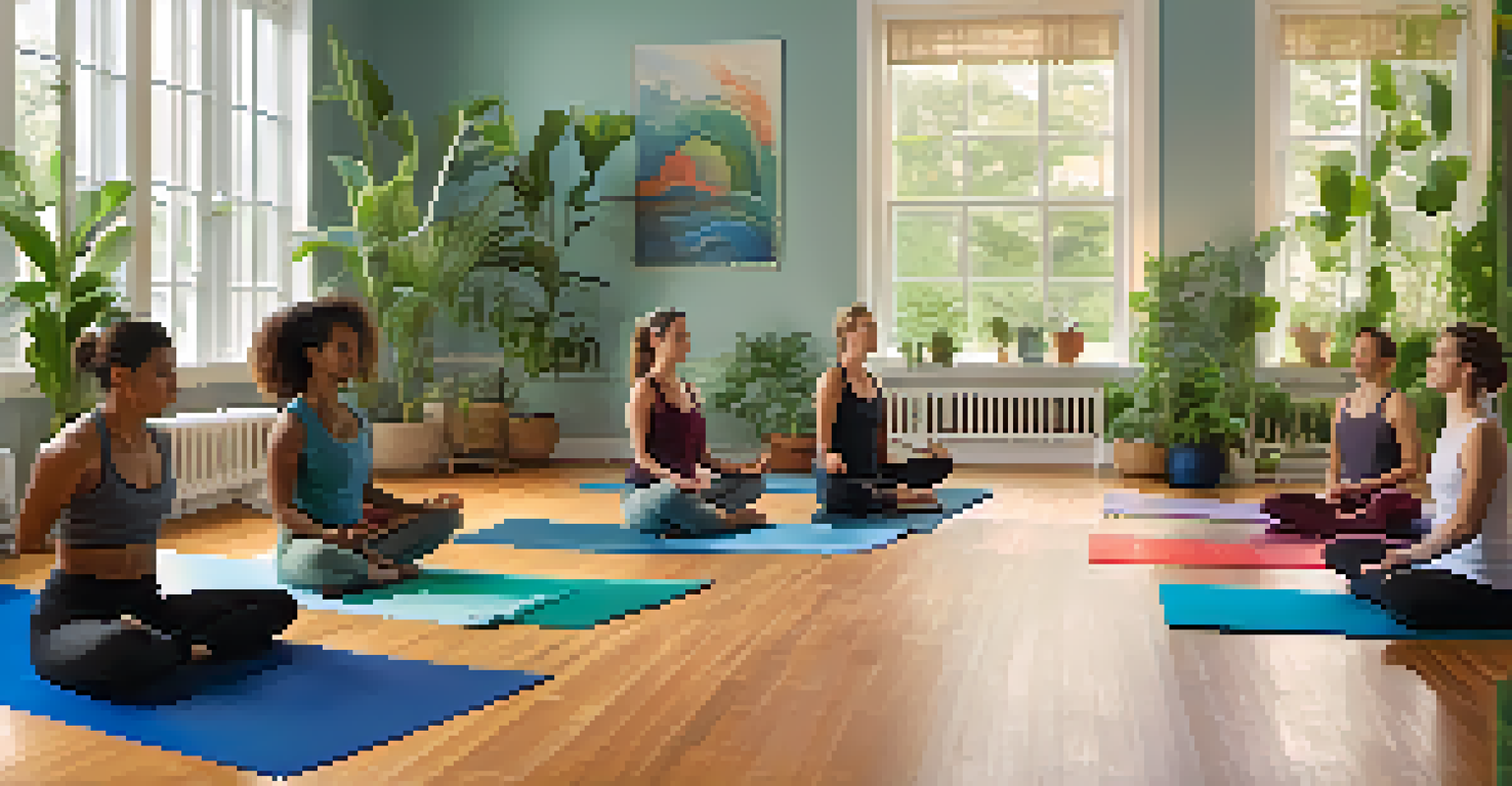Mindfulness and Resilience: Yoga Practices for Tough Times

Understanding Mindfulness in Yoga Practice
Mindfulness is all about being present and fully engaged in the moment. In yoga, this means focusing on your breath and the sensations in your body as you move through poses. By developing a mindfulness practice, you can cultivate a deeper awareness of your thoughts and feelings, which is crucial in tough times.
Mindfulness isn't difficult, we just need to remember to do it.
When you're mindful, you learn to observe your thoughts without judgment. This skill can help you navigate stressful situations more effectively, as you're less likely to react impulsively. Instead, you can pause, breathe, and respond thoughtfully, which is a key aspect of resilience.
Incorporating mindfulness into your yoga sessions allows you to create a safe space to explore your emotions. This practice can help you manage anxiety and stress, making it easier to face challenges head-on.
The Role of Resilience in Everyday Life
Resilience is the ability to bounce back from setbacks and adapt to change. It's a vital skill in our fast-paced world, where challenges can arise unexpectedly. By building resilience, you empower yourself to handle tough situations with grace and confidence.

Yoga fosters resilience by teaching you how to stay grounded during difficult times. The physical postures challenge your body and mind, encouraging you to push through discomfort and find your inner strength. This experience translates to real-life scenarios, where you may need to dig deep to overcome obstacles.
Mindfulness Enhances Yoga Practice
By focusing on breath and bodily sensations, mindfulness during yoga fosters deeper awareness and emotional resilience.
Moreover, resilience is not just about endurance; it’s also about flexibility. Just as yoga encourages fluid movement through poses, cultivating resilience involves adapting your mindset and strategies to cope with change effectively.
Yoga Techniques for Cultivating Mindfulness
There are various yoga techniques that can enhance mindfulness, such as breathwork or pranayama. Focusing on your breath not only calms your mind but also anchors you in the present moment. Simple exercises like deep belly breathing can help reduce anxiety and promote a sense of peace.
Resilience is accepting your new reality, even if it's less good than the one you had before.
Another technique is to practice yoga nidra, or yogic sleep, which encourages deep relaxation and awareness. This practice allows you to observe your thoughts and emotions without becoming overwhelmed by them, making it easier to process your experiences.
Incorporating these mindfulness techniques into your routine can create a profound sense of calm, helping you navigate tough times with a clearer perspective.
Building Resilience through Challenging Poses
Certain yoga poses are designed to challenge your physical and mental limits, which can foster resilience. For example, Warrior II and Tree Pose require balance and focus, teaching you to stay grounded even when faced with adversity. These poses encourage you to embrace discomfort and uncertainty, which are often part of life's challenges.
As you hold these poses, you may notice your mind racing or wanting to give up. This is where resilience comes into play; by recognizing these thoughts and choosing to stay in the pose, you strengthen your ability to persevere in other areas of life.
Resilience is Built Through Challenges
Challenging yoga poses teach the importance of perseverance and adaptability, essential traits for overcoming life's obstacles.
Ultimately, the practice of challenging poses not only builds physical strength but also instills a sense of determination and courage that you can carry beyond the mat.
Mindful Meditation: A Key Component
Meditation is an integral part of yoga that enhances mindfulness and resilience. By dedicating time to sit quietly and focus your mind, you create a space for reflection and self-discovery. This practice allows you to observe your thoughts without getting caught up in them, fostering a sense of inner peace.
Even just a few minutes of meditation each day can significantly reduce stress and improve your overall well-being. As you become more comfortable with stillness, you'll find it easier to handle life's unpredictability with a calm demeanor.
Incorporating mindful meditation into your yoga routine can create a powerful synergy, helping you develop a more resilient mindset as you learn to navigate the waves of life.
Creating a Supportive Yoga Community
Joining a yoga community can play a pivotal role in enhancing resilience. Surrounding yourself with like-minded individuals offers a sense of belonging and support, especially during challenging times. Sharing your experiences and challenges with others can provide comfort and encouragement.
In a supportive environment, you’re more likely to stick with your practice and stay motivated. Group classes foster camaraderie and collective energy, which can uplift your spirit and reinforce your commitment to mindfulness and resilience.
Community Supports Mindfulness Growth
Joining a yoga community provides encouragement and motivation, reinforcing your commitment to mindfulness and resilience.
Moreover, connecting with others on a similar journey can inspire you to keep pushing through challenges, reminding you that you’re not alone in facing life's hurdles.
Integrating Mindfulness and Resilience into Daily Life
The true power of yoga lies in its ability to transcend the mat and influence your daily life. By integrating mindfulness and resilience practices into your everyday routine, you can cultivate a more balanced and fulfilling life. Simple actions, like pausing to breathe before reacting to stressors, can make a significant difference.
Mindfulness can be practiced during daily activities—whether you're eating, walking, or even washing dishes. By bringing awareness to these moments, you transform mundane tasks into opportunities for connection and calm.

As you continue to develop these skills, you'll find that your capacity for resilience grows, enabling you to navigate life’s challenges with greater ease and grace.